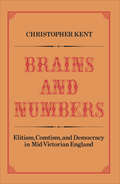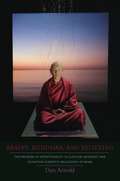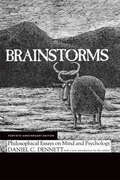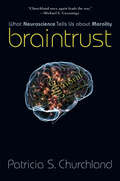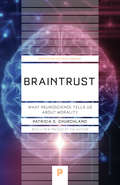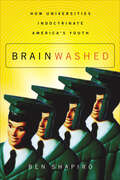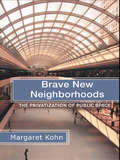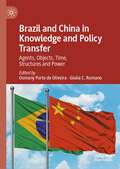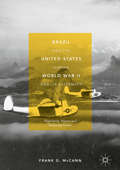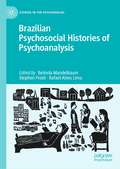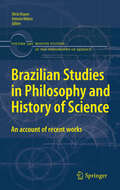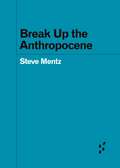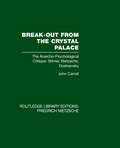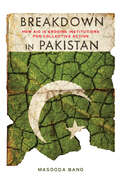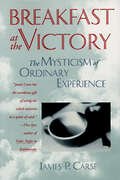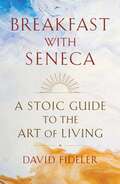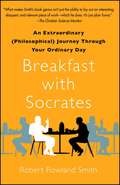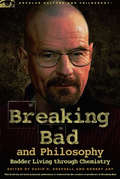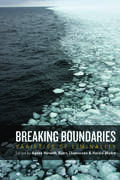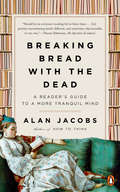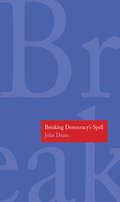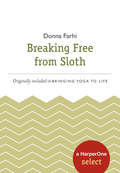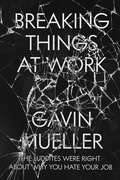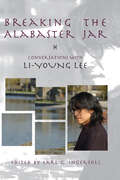- Table View
- List View
Brains and Numbers: Elitism, Comtism, and Democracy in Mid-Victorian England
by Christopher KentA group of Oxford graduates, influenced by Arnold and later by Comte, formed the core of a generation of academic radicals who attempted to define the role of an educated élite in an emerging industrial mass democracy. This perceptive study of the English academic scene traces the emergence of Comtism in the university community and examines its expression in the ideas of Frederic Harrison and John Morley. The social and political dimensions of Comte's ideology in England are commonly considered to have been obscured by the tendency to regard it as a sort of eccentric religious sect. This study demonstrates the subtlety with which Harrison applied positivist ideas to mid-Victorian politics and the generally underestimated influence of Comte in Morley's political thought. Both men looked to the frank éliticism of Comte in Morley's political thought – in both thought and action – the political claims of 'brains and numbers.' It was, as the book shows, an attempt singularly appropriate to the requirements of an educated middle class. Set within the context of mid-Victorian academic radicalism, the appeal of Comtism becomes more clear. This book brings together a complex of philosophical, political, and religious ideas. It reflects the Victorian intellectual's perspective on the process and problems of social change.
Brains, Buddhas, and Believing: The Problem of Intentionality in Classical Buddhist and Cognitive-Scientific Philosophy of Mind
by Dan ArnoldPremodern Buddhists are sometimes characterized as veritable "mind scientists" whose insights anticipate modern research on the brain and mind. Aiming to complicate this story, Dan Arnold confronts a significant obstacle to popular attempts at harmonizing classical Buddhist and modern scientific thought: since most Indian Buddhists held that the mental continuum is uninterrupted by death (its continuity is what Buddhists mean by "rebirth"), they would have no truck with the idea that everything about the mental can be explained in terms of brain events. Nevertheless, a predominant stream of Indian Buddhist thought, associated with the seventh-century thinker Dharmakirti, turns out to be vulnerable to arguments modern philosophers have leveled against physicalism.By characterizing the philosophical problems commonly faced by Dharmakirti and contemporary philosophers such as Jerry Fodor and Daniel Dennett, Arnold seeks to advance an understanding of both first-millennium Indian arguments and contemporary debates on the philosophy of mind. The issues center on what modern philosophers have called intentionality—the fact that the mind can be about (or represent or mean) other things. Tracing an account of intentionality through Kant, Wilfrid Sellars, and John McDowell, Arnold argues that intentionality cannot, in principle, be explained in causal terms.Elaborating some of Dharmakirti's central commitments (chiefly his apoha theory of meaning and his account of self-awareness), Arnold shows that despite his concern to refute physicalism, Dharmakirti's causal explanations of the mental mean that modern arguments from intentionality cut as much against his project as they do against physicalist philosophies of mind. This is evident in the arguments of some of Dharmakirti's contemporaneous Indian critics (proponents of the orthodox Brahmanical Mimasa school as well as fellow Buddhists from the Madhyamaka school of thought), whose critiques exemplify the same logic as modern arguments from intentionality. Elaborating these various strands of thought, Arnold shows that seemingly arcane arguments among first-millennium Indian thinkers can illuminate matters still very much at the heart of contemporary philosophy.
Brainstorms, Fortieth Anniversary Edition: Philosophical Essays on Mind and Psychology (The\mit Press Ser.)
by Daniel C. DennettAn anniversary edition of a classic in cognitive science, with a new introduction by the author.When Brainstorms was published in 1978, the interdisciplinary field of cognitive science was just emerging. Daniel Dennett was a young scholar who wanted to get philosophers out of their armchairs—and into conversations with psychologists, linguists, computer scientists. This collection of seventeen essays by Dennett offers a comprehensive theory of mind, encompassing traditional issues of consciousness and free will. Using careful arguments and ingenious thought experiments, the author exposes familiar preconceptions and hobbling intuitions. The essays are grouped into four sections: “Intentional Explanation and Attributions of Mentality”; “The Nature of Theory in Psychology”; “Objects of Consciousness and the Nature of Experience”; and “Free Will and Personhood.”This anniversary edition includes a new introduction by Dennett, “Reflections on Brainstorms after Forty Years,” in which he recalls the book's original publication by Harry and Betty Stanton of Bradford Books and considers the influence and afterlife of some of the essays. For example, “Mechanism and Responsibility” was Dennett's first articulation of his concept of the intentional stance; “Are Dreams Experiences?” anticipates the major ideas in his 1991 book Consciousness Explained; and “Where Am I?” has been variously represented in a BBC documentary, a student's Javanese shadow puppet play, and a feature-length film made in the Netherlands, Victim of the Brain.
Brainstorms: Philosophical Essays on Mind and Psychology
by Daniel Clement DennettDiscussions on artificial intelligence, philosophy, and cognitive psychology.
Braintrust: What Neuroscience Tells Us About Morality
by Patricia S. ChurchlandWhat is morality? Where does it come from? And why do most of us heed its call most of the time? In Braintrust, neurophilosophy pioneer Patricia Churchland argues that morality originates in the biology of the brain. She describes the "neurobiological platform of bonding" that, modified by evolutionary pressures and cultural values, has led to human styles of moral behavior. The result is a provocative genealogy of morals that asks us to reevaluate the priority given to religion, absolute rules, and pure reason in accounting for the basis of morality. Moral values, Churchland argues, are rooted in a behavior common to all mammals--the caring for offspring. The evolved structure, processes, and chemistry of the brain incline humans to strive not only for self-preservation but for the well-being of allied selves--first offspring, then mates, kin, and so on, in wider and wider "caring" circles. Separation and exclusion cause pain, and the company of loved ones causes pleasure; responding to feelings of social pain and pleasure, brains adjust their circuitry to local customs. In this way, caring is apportioned, conscience molded, and moral intuitions instilled. A key part of the story is oxytocin, an ancient body-and-brain molecule that, by decreasing the stress response, allows humans to develop the trust in one another necessary for the development of close-knit ties, social institutions, and morality. A major new account of what really makes us moral, Braintrust challenges us to reconsider the origins of some of our most cherished values.
Braintrust: What Neuroscience Tells Us about Morality (Princeton Science Library)
by Patricia S. ChurchlandWhat is morality? Where does it come from? And why do most of us heed its call most of the time? In Braintrust, neurophilosophy pioneer Patricia Churchland argues that morality originates in the biology of the brain. She describes the "neurobiological platform of bonding" that, modified by evolutionary pressures and cultural values, has led to human styles of moral behavior. The result is a provocative genealogy of morals that asks us to reevaluate the priority given to religion, absolute rules, and pure reason in accounting for the basis of morality. Moral values, Churchland argues, are rooted in a behavior common to all mammals--the caring for offspring. The evolved structure, processes, and chemistry of the brain incline humans to strive not only for self-preservation but for the well-being of allied selves--first offspring, then mates, kin, and so on, in wider and wider "caring" circles. Separation and exclusion cause pain, and the company of loved ones causes pleasure; responding to feelings of social pain and pleasure, brains adjust their circuitry to local customs. In this way, caring is apportioned, conscience molded, and moral intuitions instilled. A key part of the story is oxytocin, an ancient body-and-brain molecule that, by decreasing the stress response, allows humans to develop the trust in one another necessary for the development of close-knit ties, social institutions, and morality. A major new account of what really makes us moral, Braintrust challenges us to reconsider the origins of some of our most cherished values.
Brainwashed: How Universities Indoctrinate America's Youth
by Ben ShapiroBrainwashed is the explosive exposé of the leftist agenda at work in today's colleges, revealed by firebrand Ben Shapiro—syndicated columnist, podcaster, radio show host, and one of today's most exciting conservative voices—who&’s been on the front lines of the battle for America's young minds. This book proves once and for all that so-called higher education continues to sink lower and lower into the depths of liberal madness as close-minded professors turn their students into socialists, atheists, race-baiters, and sex-crazed narcissists.In this book, author Ben Shapiro asks three critical questions:Why are universities so biased?Why do students take their professors at face value?What can we do to stop it?In addition to outlining practical solutions as part of a multi-pronged strategy to deal with this problem, Brainwashed encourages students toconsider the motives of their professors;pay attention to how professors use facts and editorialize during lectures; andask questions, encourage debate, and think before buying into a professor&’s mindset.Praise for Brainwashed:"Ben Shapiro's writing is smart, informative, and incisive. He is wise beyond his years without losing the refreshing fearlessness of youth." Ann Coulter, bestselling author of High Crimes and Misdemeanors, Slander, and Treason"In Brainwashed, Shapiro tells the truth—that universities are forums of left-liberal indoctrination, where dissent is discouraged and penalized, with more restrictions on free speech rather any other part of American society. Parents who are paying for tuition might want to take note, and see what their hard-earned money is paying for." Michael Barone, U.S. News & World Report and co-author of The Almanac of American Politics"Welcome to P.C. 101. In this trenchant insider's expose, Ben Shapiro bears witness to the modern American campus freak show. You'll get up close and personal with the Marxist loons, moral relativists, multicultural zealots, and American-haters who are corrupting young minds. Brainwashed reveals the ignominious lows to which higher education has sunk. Get deprogrammed. Buy this book!" Michelle Malkin, nationally syndicated columnist and author of Invasion"Sharp thinking, tight writing, crazy-but-true stories: Ben Shapiro sees campus brainwashing and raises a national protest. This is a good book to give both freshmen who need warning and voters/alumni who need to take action." Dr. Marvin Olasky, University of Texas professor and editor-in-chief of World magazine"A worthy successor to God and Man at Yale and Harvard Hates America in exploring the belly of the academic beast." David Horowitz, founder of Students for Academic Freedom and author of Radical Son and Left Illusions"What Animal House did for the toga party, Brainwashed should do for American resistance to campus radicalism." Rusty Humphries, nationally syndicated radio talk show host
Brave New Neighborhoods: The Privatization of Public Space
by Margaret KohnFighting for First Amendment rights is as popular a pastime as ever, but just because you can get on your soapbox doesn't mean anyone will be there to listen. Town squares have emptied out as shoppers decamp for the megamalls; gated communities keep pesky signature gathering activists away; even most internet chatrooms are run by the major media companies. Brave New Neighborhood sconsiders what can be done to protect and revitalize our public spaces.
Brazil and China in Knowledge and Policy Transfer: Agents, Objects, Time, Structures and Power
by Osmany Porto de Oliveira Giulia C. RomanoThis book examines knowledge and policy transfer from the perspectives of Brazil and China. It assesses how these two nations have emerged as providers of ideas and models that contribute to the global offer of public policies. With a variety of case studies in areas such as health, food security and infrastructure, the volume offers new insights into the distinct levels through which knowledge and policy transfers take place, including the local, regional, national and supranational. It develops a multidimensional framework of analysis that considers the agents, objects, and mechanisms for knowledge and policy transfer, as well as the structures and timings within which they operate. Unlike previous studies on policy transfer – which largely focus on North-North and North-South learning processes – this book offers an innovative approach to this area of study. By reflecting on the experiences of these two rising powers, it provides fresh insights on the future of knowledge and policy transfer as global power dynamics shift. This interdisciplinary study will appeal to students and scholars of policy transfer, development studies, international relations and public policy.
Brazil and the United States during World War II and Its Aftermath: Negotiating Alliance and Balancing Giants
by Frank D. McCannThe military alliance between the United States and Brazil played a critical role in the outcome of World War II, and yet it is largely overlooked in historiography of the war. In this definitive account, Frank McCann investigates Brazilian-American military relations from the 1930s through the years after the alliance ended in 1977. The two countries emerge as imbalanced giants with often divergent objectives and expectations. They nevertheless managed to form the Brazilian Expeditionary Force and a fighter squadron that fought in Italy under American command, making Brazil the only Latin American country to commit troops to the war. With the establishment of the US Air Force base in Natal, Northeast Brazil become a vital staging area for air traffic supplying Allied forces in the Middle East and Asian theaters. McCann deftly analyzes newly opened Brazilian archives and declassified American intelligence files to offer a more nuanced account of how this alliance changed the course of World War II, and how the relationship deteriorated in the aftermath of the war.
Brazilian Psychosocial Histories of Psychoanalysis (Studies in the Psychosocial)
by Stephen Frosh Belinda Mandelbaum Rafael Alves LimaThis edited volume provides a critical history of psychoanalysis in Brazil. Written mainly by Brazilian historians and practitioners of psychoanalysis, the chapters address some central questions about psychoanalysis’ social role. How did psychoanalysis develop and flourish in a society in which modernisation was accompanied by inequality, authoritarianism and violence? How did psychoanalysis survive in Brazil alongside censorship and repression? Through a variety of lenses, the contributors demonstrate how psychoanalysis in Brazil presented itself as progressive and transformative and maintained this self-image even as it developed institutional structures that reproduce the authoritarianism of the wider society. This novel work offers rich conceptual and practical insights for academic researchers and practitioners of psychoanalysis and psychoanalytic psychotherapy, and addresses methodological questions of concern to academics working across the social sciences. Crucially, it also outlines a distinctive vision of psychoanalysis seen through a Brazilian lens, which will be of interest to readers seeking to confront the Eurocentric and North American bias of much psychoanalytic debate.
Brazilian Studies in Philosophy and History of Science: An account of recent works (Boston Studies in the Philosophy and History of Science #290)
by Décio Krause Antonio VideiraThis volume, The Brazilian Studies in the Philosophy and History of Science, is the first attempt to present to a general audience, works from Brazil on this subject. The included papers are original, covering a remarkable number of relevant topics of philosophy of science, logic and on the history of science. The Brazilian community has increased in the last years in quantity and in quality of the works, most of them being published in respectable international journals on the subject. The chapters of this volume are forwarded by a general introduction, which aims to sketch not only the contents of the chapters, but it is conceived as a historical and conceptual guide to the development of the field in Brazil. The introduction intends to be useful to the reader, and not only to the specialist, helping them to evaluate the increase in production of this country within the international context.
Break Up the Anthropocene (Forerunners: Ideas First)
by Steve MentzTakes the singular eco-catastrophic &“Age of Man&” and redefines this epoch We live in a new world: the Anthropocene. The Age of Man is defined in many ways, and most dramatically through climate change, mass extinction, and human marks in the geological record. Ideas of the Anthropocene spill out from the geophysical sciences into the humanities, social sciences, the arts, and mainstream debates—but it&’s hard to know what the new coinage really means. Break Up the Anthropocene argues that this age should subvert imperial masculinity and industrial conquest by opening up the plural possibilities of Anthropocene debates of resilience, adaptation, and the struggle for environmental justice. Forerunners: Ideas First Short books of thought-in-process scholarship, where intense analysis, questioning, and speculation take the lead
Break-Out from the Crystal Palace: The Anarcho-Psychological Critique: Stirner, Nietzsche, Dostoevsky (Rouledge Library Editions: Friedrich Nietzsche)
by John CarrollBefore Marcuse and Laing, before Heidegger and Sartre, even before Freud, the way was prepared for the anarcho-psychological critique of economic man, of all codes of ideology or absolute morality, and of scientific habits of mind. First published in 1974, this title traces this philosophical tradition to its roots in the nineteenth century, to the figures of Stirner, Nietzsche and Dostoevsky, and to their psychological demolition of the two alternative axes of social theory and practice, a critique which today reads more pertinently than ever, and remains unanswered. To understand this critique is crucial for an age which has shown a mounting revulsion at the consequences of the Crystal Palace, symbol at once of technologico-industrial progress and its rationalist-scientist ideology, an age whose imaginative preoccupations have telescoped onto the individual, and whose interest has switched from the social realm to that of anarchic, inner, 'psychological man'.
Breakdown in Pakistan: How Aid Is Eroding Institutions for Collective Action
by Masooda BanoThirty percent of foreign development aid is channeled through NGOs or community-based organizations to improve service delivery to the poor, build social capital, and establish democracy in developing nations. However, growing evidence suggests that aid often erodes, rather than promotes, cooperation within developing nations. This book presents a rare, micro level account of the complex decision-making processes that bring individuals together to form collective-action platforms. It then examines why aid often breaks down the very institutions for collective action that it aims to promote. Breakdown in Pakistan identifies concrete measures to check the erosion of cooperation in foreign aid scenarios. Pakistan is one of the largest recipients of international development aid, and therefore the empirical details presented are particularly relevant for policy. The book's argument is equally applicable to a number of other developing countries, and has important implications for recent discussions within the field of economics.
Breakfast at the Victory: The Mysticism of Ordinary Experience
by James P. CarseThe author explores manifestations of the divine in his daily life in this blend of spiritual meditation and memoir.Tapping spiritual sources that range from the silence of the Buddha to the words of Robert Forst, James Carse uncovers the rich paradoxes of everyday experience and emerges as a genuine American mystic. Breakfast at the Victory, Carse writes, is “an invitation to see how extraordinary the ordinary is.” After reading it, life may never appear the same.Praise for Breakfast at the Victory“Carse has the wondrous gift of seeing the whole universe in a grain of sand. Starting from deceptively small beginnings, he opens up a whole world of daily miracles.” —Pico Iyer, author of Video Night in Kathmandu“Succeed[s] in teaching a kind of vision and appreciation for the otherwise regular and humdrum.” —Los Angeles Times Book Review“Plainspoken yet brilliant.” —Booklist“This thought-provoking book turns ordinary experiences on their heads, almost forcing readers to find the mystical in their own subjective engagement of daily events. . . . [Carse] brings the profound within the grasp of everyone.” —Publishers Weekly
Breakfast with Seneca: A Stoic Guide To The Art Of Living
by David FidelerThe first clear and faithful guide to the timeless, practical teachings of the Stoic philosopher Seneca. Stoicism, the most influential philosophy of the Roman Empire, offers refreshingly modern ways to strengthen our inner character in the face of an unpredictable world. Widely recognized as the most talented and humane writer of the Stoic tradition, Seneca teaches us to live with freedom and purpose. His most enduring work, over a hundred “Letters from a Stoic” written to a close friend, explains how to handle adversity; overcome grief, anxiety, and anger; transform setbacks into opportunities for growth; and recognize the true nature of friendship. In Breakfast with Seneca, philosopher David Fideler mines Seneca’s classic works in a series of focused chapters, clearly explaining Seneca’s ideas without oversimplifying them. Best enjoyed as a daily ritual, like an energizing cup of coffee, Seneca’s wisdom provides us with a steady stream of time-tested advice about the human condition—which, as it turns out, hasn’t changed much over the past two thousand years.
Breakfast with Socrates: An Extraordinary (Philosophical) Journey Through Your Ordinary Day
by Robert Rowland SmithWhat is the philosophy of sweat? Reality TV? Domestic warfare? Making up and having sex? Take a sparkling ride through an ordinary day with hilarious philosophical gadfly Robert Rowland Smith in Breakfast with Socrates.Ever want to have a bagel with Hegel? Eggs with Bacon? Or spend a day with Socrates, Mill, Herodotus, or Kant, able to pick their brains about the most mundane moments of your life? Former Oxford Philosophy Fellow Robert Rowland Smith thought he would, and so with dry wit and marvelous invention, Smith whisks you through a typical day, injecting a little philosophy into it at every turn. Wake up with Descartes, go to work with Plato and Nietzsche, visit the gym with Kant, have sex with Ovid (or Simone de Beauvoir). As the day unfolds, Smith grounds complex, abstract ideas in concrete experience, giving you an informal introduction to applying philosophy to everyday life. Not only does Breakfast with Socrates cover the basic arguments of philosophy, it brings an irresistible, insouciant charm to its big questions, waking us up to the richest possible range of ideas on how to live. Neither breakfast, lunch, nor dinner will ever be the same again.
Breaking Bad and Philosophy
by Robert Arp David R. KoepsellBreaking Bad, hailed by Stephen King, Chuck Klosterman, and many others as the best of all TV dramas, tells the story of a man whose life changes because of the medical death sentence of an advanced cancer diagnosis. The show depicts his metamorphosis from inoffensive chemistry teacher to feared drug lord and remorseless killer. Driven at first by the desire to save his family from destitution, he risks losing his family altogether because of his new life of crime. In defiance of the tradition that viewers demand a TV character who never changes, Breaking Bad is all about the process of change, with each scene carrying forward the morphing of Walter White into the terrible Heisenberg. Can a person be transformed as the result of a few key life choices? Does everyone have the potential to be a ruthless criminal? How will we respond to the knowledge that we will be dead in six months? Is human life subject to laws as remorseless as chemical equations? When does injustice validate brutal retaliation? Why are drug addicts unsuitable for operating the illegal drug business? How can TV viewers remain loyal to a series where the hero becomes the villain? Does Heisenberg's Principle of Uncertainty rule our destinies? In Breaking Bad and Philosophy, a hand-picked squad of professional thinkers investigate the crimes of Walter White, showing how this story relates to the major themes of philosophy and the major life decisions facing all of us.
Breaking Boundaries: Varieties of Liminality
by Bjørn Thomassen Harald Wydra Agnes HorvathLiminality has the potential to be a leading paradigm for understanding transformation in a globalizing world. As a fundamental human experience, liminality transmits cultural practices, codes, rituals, and meanings in situations that fall between defined structures and have uncertain outcomes. Based on case studies of some of the most important crises in history, society, and politics, this volume explores the methodological range and applicability of the concept to a variety of concrete social and political problems.
Breaking Bread with the Dead: A Reader's Guide to a More Tranquil Mind
by Alan JacobsFrom the author of HOW TO THINK and THE PLEASURES OF READING IN AN AGE OF DISTRACTION, a literary guide to engaging with the voices of the past to stay sane in the presentW. H. Auden once wrote that "art is our chief means of breaking bread with the dead." In his brilliant and compulsively readable new treatise, Breaking Bread with the Dead, Alan Jacobs shows us that engaging with the strange and wonderful writings of the past might help us live less anxiously in the present--and increase what Thomas Pynchon once called our "personal density."Today we are battling too much information in a society changing at lightning speed, with algorithms aimed at shaping our every thought--plus a sense that history offers no resources, only impediments to overcome or ignore. The modern solution to our problems is to surround ourselves only with what we know and what brings us instant comfort. Jacobs's answer is the opposite: to be in conversation with, and challenged by, those from the past who can tell us what we never thought we needed to know.What can Homer teach us about force? How does Frederick Douglass deal with the massive blind spots of America's Founding Fathers? And what can we learn from modern authors who engage passionately and profoundly with the past? How can Ursula K. Le Guin show us truths about Virgil's female characters that Virgil himself could never have seen? In Breaking Bread with the Dead, a gifted scholar draws us into close and sympathetic engagement with texts from across the ages, including the work of Anita Desai, Henrik Ibsen, Jean Rhys, Simone Weil, Edith Wharton, Amitav Ghosh, Claude Lévi-Strauss, Italo Calvino, and many more.By hearing the voices of the past, we can expand our consciousness, our sympathies, and our wisdom far beyond what our present moment can offer.
Breaking Democracy's Spell
by John DunnIn this timely and important work, eminent political theorist John Dunn argues that democracy is not synonymous with good government. The author explores the labyrinthine reality behind the basic concept of democracy, demonstrating how the political system that people in the West generally view as straightforward and obvious is, in fact, deeply unclear and, in many cases, dysfunctional. Consisting of four thought-provoking lectures, Dunn's book sketches the path by which democracy became the only form of government with moral legitimacy, analyzes the contradictions and pitfalls of modern American democracy, and challenges the academic world to take responsibility for giving the world a more coherent understanding of this widely misrepresented political institution. Suggesting that the supposedly ideal marriage of liberal economics with liberal democracy can neither ensure its continuance nor even address the problems of contemporary life, this courageous analysis attempts to show how we came to be so gripped by democracy's spell and why we must now learn to break it.
Breaking Free from Sloth
by Donna FarhiIn this selection from Bringing Yoga to Life, one of America's most respected and loved Yoga teachers helps free us from the trivial humdrum of daily life and shows us how to live more fully by connecting with our soul. In Breaking Free from Sloth, Donna Farhi presents the philosophy of yoga as a path to a deeper awareness of self. Drawing upon her years of teaching with students and writing in an engaging and accessible style, Farhi guides readers through the pitfalls of sloth and reveals the promises of navigating a spiritual practice. "If we define a Yoga practice as an awareness of and investment in our most cherished values, we may be dismayed to discover how little real energy we designate to the central purpose of our life. So when I speak of a habitual disinclination toward effort, I am speaking specifically about purposeful effort. In what ways are we sabotaging ourselves, and how can we extricate ourselves from the mire of self-indulgence?"-from Breaking Free from Sloth
Breaking Things at Work: The Luddites Are Right About Why You Hate Your Job
by Gavin MuellerAn exhilarating challenge to the way we think about work, technology, progress, and what we want from the futureIn the 19th century, English textile workers responded to the introduction of new tecnologies on the factory floor by smashing them to bits. For years 'the Luddites' roamed the English countryside, practicing drills and maneuvers that they would later deploy on unassuming machines. The movement has been derided by scholars as a backwards-looking and ultimately ineffectual effort to stem the march of history; for Gavin Mueller, the movement gets at the heart of of the antagonistic relationship between workers - all workers, including us today - and the so-called progressive gains secured by new technologies. The luddites weren't primitive or even anachronistic - they are still a force, however unconsciously, in the workplaces of the 21st century world. Breaking Things at Work is an innovative rethinking of labor and machines, leaping from textile mills to algorithms, from existentially threatened knife cutters of rural Germany to surveillance evading truckers driving across the continental United States. Mueller argues that the future stability and empowerment of working class movements will depend on subverting these technologies and preventing their spread wherever possible. The task is high, but the seeds of this resistance are already present in the Neo-Luddite efforts of hackers, pirates, and dark web users who are challenging surveillance and control, often through older systems of communication technology.
Breaking the Alabaster Jar: Conversations with Li-Young Lee (American Readers Series)
by Li-Young LeeIn the foreword to Li-Young Lee&’s first book, Rose (BOA Editions, 1986), Gerald Stern wrote, &“What characterizes Li-Young Lee&’s poetry is a certain kind of humility, a kind of cunning, a love of plain speech, a search for wisdom and understanding. . . . I think we are in the presence of a true spirit.&” Poetry lovers agree! Rose has gone on to sell more than eighty thousand copies, and Li-Young Lee has become one of the country&’s most beloved poets. Breaking the Alabaster Jar: Conversations with Li-Young Lee is a collection of the best dozen interviews given by Li-Young Lee over the past twenty years. From a twenty-nine-year-old poet prodigy to a seasoned veteran in high demand for readings and appearances across the United States and abroad, these interviews capture Li-Young Lee at various stages of his artistic development. He not only discusses his family&’s flight from political oppression in China and Indonesia, but how that journey affected his poetry and the engaging, often painful, insights being raised a cultural outsider in America afforded him. Other topics include spirituality (primarily Christianity and Buddhism) and a wide range of aesthetic topics such as literary influences, his own writing practices, the role of formal and informal education in becoming a writer, and his current life as a famous and highly sought-after American poet.
